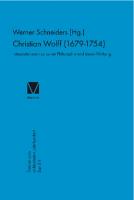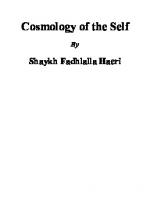Dynamism in the Cosmology of Christian Wolff
135 78 11MB
English Pages 126 Year 1965
Recommend Papers
File loading please wait...
Citation preview
DYNAMISM in the
COSMOLOGY of
CHRISTIAN WOLFF
Dynamism in the Cosmology of Christian Wolff A Study in Pre�critical Rationalism
by REV.
John V. Burns,
c.M., Ph.D.
An Exposition-University Book
EXPOSITION PRESS. NEW YORK
IMPRIMI POTEST A. TAGGART, C.M. Provincial Superior SYLVESTER
NIHIL OBSTAT FRANCIS
J.
BREIDENBACH,
Censor Deputatus
PH.D.
IMPRI�IATUR ffi
TERENCE
J.
COOKE
Vicar General
New York, N.Y. August 20, 1965 The nihil obstat and imprimatur are official declarations that a book or pamphlet is free of doctrinal or moral error. No implication is contained therein that those who have granted the nihil obstat and imprimatur agree with the contents, opinions or statements expressed.
ExPosrnoN PRESS INC., 386 Park Avenue South, New York 10016 FIRST
EDITION
©
1966 by John V. Burns. All rights reserved, including the right of reproduction in whole or in part in any form, except for sho1t quotations in critical essays and rev-iews. Manufactured in the United States of America. Library of Congress catalog-card number: 65-28076.
EP 44025
To
my confreres and preceptors whose direction and encouragement have made this book possible
CONTENTS INTRODUCTION
The Man and His Time I
SUBSTANCE
Essentials Attributes and Modes Existence Is a Mode of Finite Beings Determinations: Constant and Variable Simple Substance Attributes of Simple Being Composed Being or Compound Substance The Attributes of Composed Being
II
17 21 24 28 29 39 43 44 47
BODIES
Essence of Bodies Nature of Bodies Active or Motor Force The Necessary Connection Between Force and Action The Varieties of Force The Determinants of Active or Motor Force
III
9
THE
ELEMENTS
The The The The
Qualities of the Elements Elements as a Source of Actuality Internal State of the Elements Soul
51 53 61 62 71 75
83 85 88 91 97
8
CONTENTS
IV
CONCLUSION
101
BIBLIOGRAPHY
Primary Works Secondary Works INDEX OF PROPER NA�1ES SUBJEC'T INDEX
111 112
115 117
INTRO DUCTION
THE MAN AND HIS TIME THE history of modem philosophy does not surprise us when we find recorded in it the development of the germs and tendencies inherited from the Renaissance. The increased interest and marked progress in the natural sciences which accompanied the Renaissance, and the rationalistic spirit which it generated, had a marked influence on the philosophical tendencies of the suc ceeding centuries. 1 The sixteenth to the eighteenth century com prises the first period in the history of modem philosophy. This book does not call for a detailed analysis of the effects of the Renaissance upon this period, but there can and should be indicated some of the characteristics of this period which had a more marked influence upon Christian Wolff. The first period of the history of modern philosophy was an age of decision. �1aritain remarks reflectively that during that period '\vas enacted an obscure drama between physico-mathe matical kno,vledge and philosophical knowledge of sensible nature: its consequences have been capital for metaphysics itself and for the intellect of mankind." 2 The two centuries following the Renaissance an










